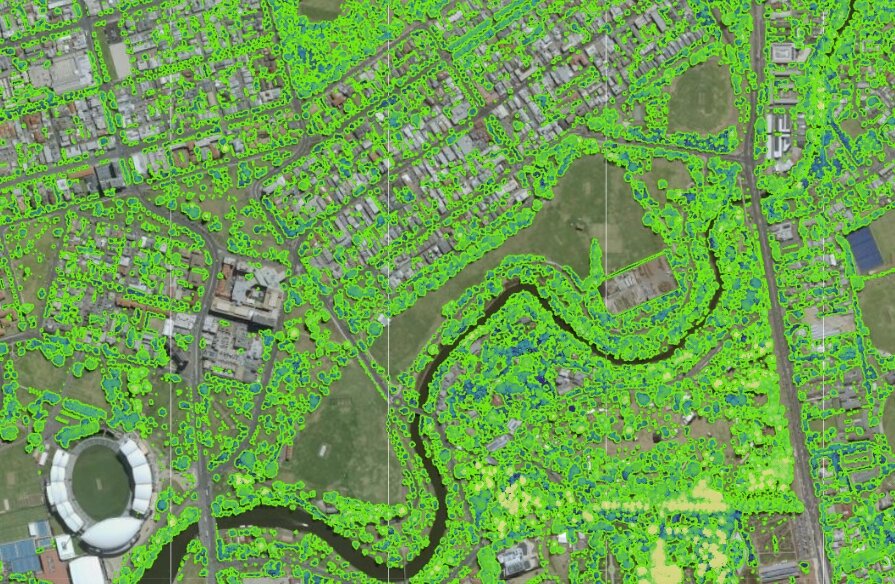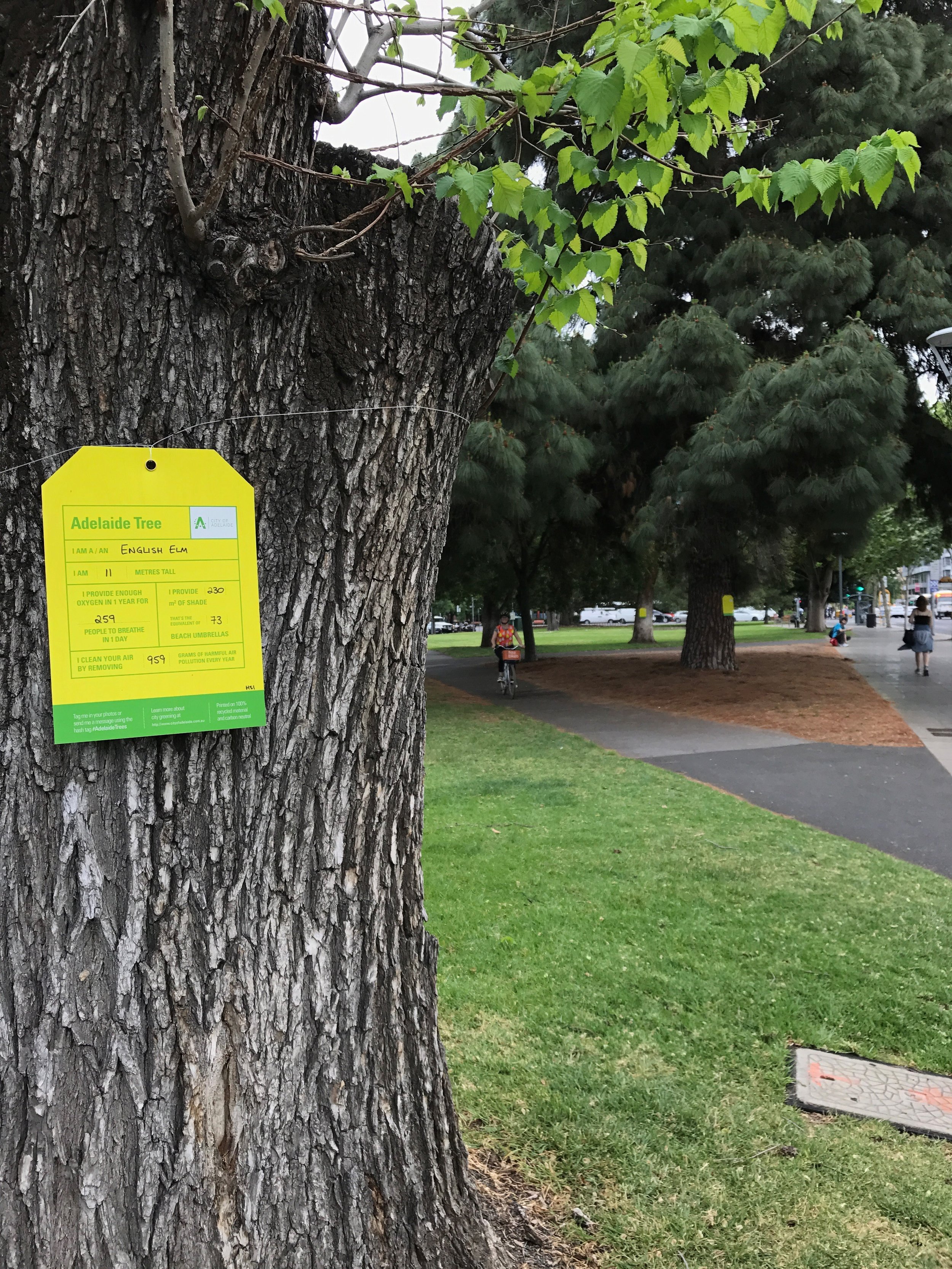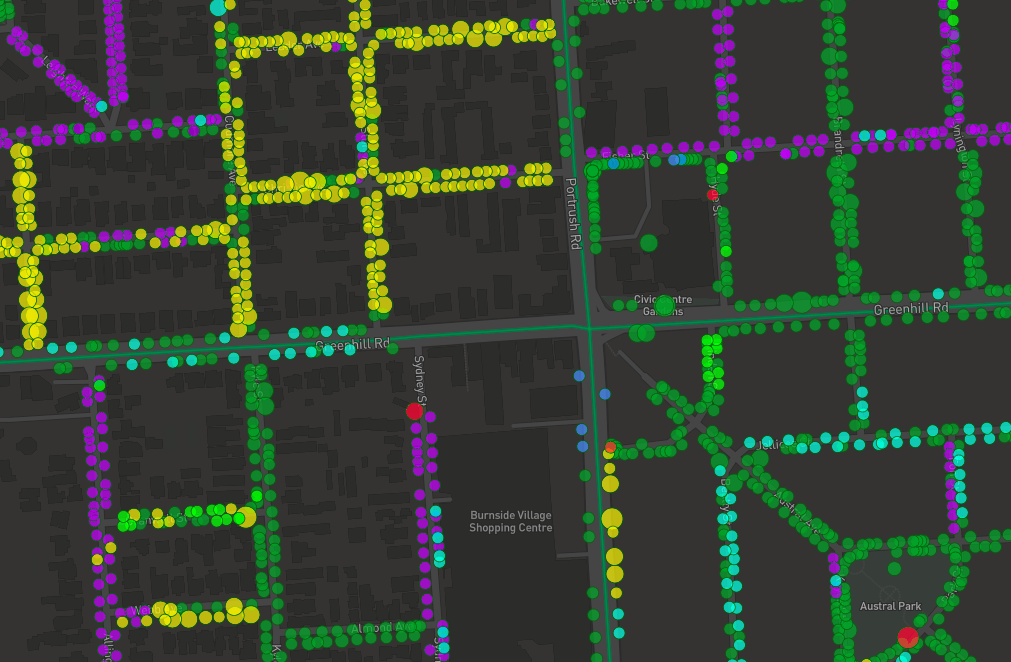There is time to make a difference, but we need to act now
The climate in eastern Adelaide has already experienced changes with more intense storms, flooding, heatwaves and bushfires. If the climate continues to change, we will face serious risks that will become increasingly difficult to manage.
This section shows how Resilient East is responding and some ways that you can get involved.
YOU CAN'T ARB THAT! frequently asked questions on trees
We are often asked questions about trees and their management.
So, we’ve come up with 21 Tree FAQs and answers to help your curiosity!
Some of the FAQs feature a complementing ‘You Can’t Arb That’ video - 90 second engaging interviews with arborists.
My Cool Home tool
Regardless of your home or budget, there are things you can DIY, or, work with an architect or builder to renovate or refurbish.
Get started bu using our 3D interactive house and garden walk-through, and, My Cool Home assessment tool. You’ll find relevant information and you can use the tool to assess the energy efficiency and comfort of your exisiting or future home.
Climate Ready Homes
Is your home is the most energy efficient it can be? Want to save money on energy bills? What makes a sustainable home and what are some simple things you can to improve yours?
Here’s some information to help you if you’re building, buying, renovating or simply wanting to improve your home and lifestyle.
Our Water Smart region
We are working at a local level to ensure our region is water smart and resilient to climate change.
Being water smart is important to achieving a healthy, green, liveable city as it promotes planting more trees and vegetation, increasing biodiversity, becoming more efficient and managing water smarter.
Cool Spaces for Summer trial
During February and March 2024, the City of Campbelltown trialled activating dedicated Cool Spaces for its community to use during heatwaves.
Thanks to a Disaster Risk Reduction Grant from the Government of South Australia, if an extreme or severe heatwave was declared, the Campbelltown Library and ARC Campbelltown activated with a range of activities for all ages to stay cool and entertained. Transportation assistance was also offered.
To keep up to date on the success of this trial, check out Campbelltown’s social media and website, or, register to be directly notified when heatwaves are declared and spaces activated.
Climate Risk Training & Engagement Package
Climate liability and climate risk management are ongoing issues in local government.
This project looks to develop a guide that includes tools, case studies and recommendations for councils to implement a successful climate risk capacity program (covering physical, transitional, governance, legal and financial risks). Working together, it will be delivered in 2024 through established networks, including the Regional Climate Partnership, the Climate Practitioners Network and the Environmental Sustainability Network.
My Canopy - City of Unley
Have you ever wondered exactly how much tree cover you have at your place?
City of Unley has developed a new interactive map, MyCanopy, to help keep Unley leafy for future generations. The online tool allows residents & property owners to view tree canopy changes on their property overtime using LiDAR technology data captured in 2018 and 2021. For the first time, they are also providing the percentage of tree canopy cover on quarterly rates notices.
This groundbreaking technology has won Council the local government award at the 2022 iTnews Benchmark Awards.
Greening Verges by Kent Town Residents Association
Kent Town Residents Association are helping to create more liveable places, set out to green and restore biodiversity to their buzzing neighbourhood.
Green Adelaide’s Grassroots Grant enabled the community group to purchase the plants and materials to create nature strip gardens along Grenfell Street.
The City of Norwood, Payneham & St Peters prepared the verges for planting, and the group volunteered their time to plant the verges and make access paths with the help of some of the residents.
Cooling Campbelltown
In 2020, Campbelltown City Council received a Greener Neighbourhood Grant from Green Adelaide to help address some challenges in relation to greening and cooling the city. Different approaches to planting trees and directing more water to them were used in a few streets located in high priority, challenging areas.
This included:
installing "tree verges" in places of limited verge space;
building larger garden verge areas around existing mature trees during new road construction;
installing 15 street tree inlets; and
other water sensitive urban design methods.
Council has planted 550 plants and trees and 26 street trees as part of this project, as well as over 20 water sensitive design elements.
Park Lands bio-cultural burn, City of Adelaide
A bio-cultural burn was held in Carriageway Park, Tuthangga (Park 17) on Friday, 14 May 2021 - the first in over 240 years.
A ground breaking and nationally significant project, where the partnership between the Kaurna community and the City of Adelaide demonstrated a strong commitment to meaningful reconciliation though the reintroduction of traditional fire management practices.
The bio-cultural burn was a historic, moving and joyous occasion. It was the first time Kaurna people were able to publicly practice cultural burning techniques, since many of their customs were displaced following European colonisation. It was also the first time a bio-cultural burn took place in an Australian capital city.
a review of natural grass versus synthetic for recreation and sport, City of Adelaide
Outdoor sports have traditionally been played on natural grass fields, though over the past few decades synthetic turf has also become popular.
The use of synthetics, however, has caused concern due to associated negative environmental and health impacts. This report explores the benefits and disadvantages of the two surfaces.
The study was conducted through University of Adelaide’s Industry Engaged PhD Program with an intern hosted at the City of Adelaide.
The findings suggest natural grass has multiple health and environmental benefits, while synthetic options can withstand more use.
Tree Canopy Cover and Height Mapping
In a first for metropolitan Adelaide, we collaborated with Adapting Northern Adelaide, Resilient South and AdaptWest to capture a baseline of tree canopy cover and height for all trees over three metres.
Using LiDAR (Light Detection & Ranging) technology, we captured high resolution, 3D tree data by flying across the Adelaide region.
The data shows that tree canopy represents 23% of metro Adelaide, which is below the recommended 30% identified in the 30-Year Plan for Greater Adelaide. For our Resilient East region, we are almost there with 28% canopy cover, and 7 out of 8 councils above the average! It also shows that our greatest opportunity to increase tree cover is by planting and maintaining trees on private land, as there simply is not enough space on public land to meet this target alone.
As we experience longer and hotter heatwaves, this data is critical to help us plan for trees in our backyards, streets and neighbourhoods.
You can better plan your home or business by viewing the data, alongside heat maps, on the Urban Heat and Tree Mapping Viewer.
Green Tunnel Project, City of Prospect
The City of Prospect is well known for leafy, attractive, tree-lined streets with beautiful canopies.
As part of a Green Tunnel Strategy, Council is committing $9.4 million over 30 years to ensure trees remain a strong part of the City’s future.
Using our Heat Maps, Council is prioritising areas of public land for planting, to create ‘green tunnels’ and a cooler, liveable City. By identifying urban heat spots, we take on a proactive approach to tree planting and increase local resilience.
Trees are a long-term investment and it can take between 10 to 30 years to experience the benefits of today’s actions. Selected species will be chosen based on their ability to form a ‘green tunnel’, with canopies eventually touching across a street overtime. By planting larger trees, we can also achieve a ‘green tunnel’ effect faster.
Cool Road adelaide
City of Adelaide with Climate-KIC Australia and the Department for Environment and Water undertook the Cool Road Adelaide project to test heat reflective seal coats that may help combat urban heat now and in the future.
Three seal coats on the same road (Bowen Street West, Adelaide) were trialed to understand the advantages and disadvantages of the products, taking into consideration urban heat, road preservation and community perception. The seal coats were tested for both land surface and air temperature.
Climate ready Communities
We have partnered with the Australian Red Cross to help communities become climate ready and prepare for extreme climate events. Climate Ready Communities empowers people to understand the risks they currently face, the ways these are changing and what they can do to build resilience.
Participants (Climate Ready Champions) are given free training on how to support others to take action and become climate ready. They are provided with practical guidance to deliver activities and events across South Australia, as well as opportunities to get involved in Red Cross’ emergency response and preparedness activities.
If you are keen to start conversations with your own networks, check out Climate-Ready Communities: A Guide to Getting Started or check out these Climate Ready Resources.
Case studies of our water sensitive Region
We have partnered with Water Sensitive SA to showcase how we are using water sensitive urban design (WSUD) techniques to transform urban landscapes and enhance the liveability in the eastern Adelaide region.
Click here to search the Interactive Map and view project case studies.
You will find some of our projects like the rain gardens at Randolph Ave, Fullarton or the City of Burnsides B-Pods that capture water from household roofs to water street trees.
Feeling Hot Hot Hot!
The City of Adelaide, on behalf of Resilient East, hosted Feeling Hot, Hot, Hot! The event helped to better prepare the community for the challenges posed by extreme weather and heatwaves in Adelaide.
Senior representatives from Business SA, SA State Emergency Service, SA Power Networks, South Australian Tourism Commission, Bureau of Meteorology, Adelaide Sustainable Building Network, SA Health, Australian Red Cross provided advice on practical actions that the community can take to manage risks and be climate ready.
Heat Mapping
Our Heat Maps were launched on the 6th of February 2019 at Feeling Hot Hot Hot!
Partnering with the Department of Environment and Water (DEW), we have mapped heat in our suburbs and vegetation health to identify areas most at risk. As temperatures continue to rise, we can use this tool to cool our houses, streets and cities.
Find out how heat exposed your property or neighbourhood is by entering your address into the search function of the Urban Heat and Tree Mapping Viewer. If you’re not in the eastern region, no worries! The heat maps are available across metropolitan Adelaide.
To assist you in using the online tool, we have developed six fun and interactive Urban Heat factsheets!
Tree Tags
It’s official, trees are awesome!
We all know the relief of finding a cool spot under a tree or walking along a shady, tree lined street on a hot day. Trees are vital for our wellbeing especially in urban areas where there are more hard surfaces, as they provide shade and reduce the impact of radiant heat. That’s why we are planting more trees to keep our towns and suburbs cool and liveable. Through our Tree Tags Project, we have calculated the value of some individual trees and are promoting their benefits to the community.
Check out this video to learn more about the value of trees!
Ridge Park flood control dam and Managed aquifer recharge (MAR) scheme, City of Unley
Ridge Park Dam on Glen Osmond Creek, delays water outflow to reduce flood risks along the creek. The dam was constructed in 2014/15 and serves the dual purpose of flood mitigation and stormwater harvesting.
The project is contributing to climate adaptation by reducing flood risk adjacent to the Glen Osmond creek whilst preserving the environmental attributes of the park. The project expands green open spaces beyond the park towards the effort to create a cooler greener Resilient East region.
Sustainable Garden Award Program, City of Norwood Payneham & St Peters
The Sustainable Garden Award program aims to foster, recognise, celebrate and reward community interest and the important contribution gardens and landscaped areas make to the Cities environment and community.
To complement the Awards, Council hosts a series of free sustainable gardening events with well-known South Australian industry experts.
This has proven to be a great way to promote emerging trends in sustainable gardening, including green walls, nature play gardens, kerbside gardens and bee hotels.
Greening of street verges, City of Unley
City of Unley has established a program for the greening of street verges in partnership with the community. In this initiative, Council removes compacted dolomite and replaces with loam to enable plants to grow successfully, and rain to infiltrate. Residents help by planting and maintaining verge gardens.
This helps to increase public green space, which is limited in the City of Unley. It improves amenity, urban biodiversity and supports increased canopy cover which is key to reducing urban heat.
Council also developed a planting guide and display verges for inspiration to assist residents make suitable choices. Visit the display verges at Edmund Avenue, Unley.
Urban Forest Interactive
The City of Burnside’s Urban Forest Interactive is an exciting new interactive website communicating the benefits of the Urban Forest through the utilisation of Council data collected on over 40,000 public street and park trees.
Explore the Urban Forest using the interactive map to view individual tree data throughout the City of Burnside, including tree species, age, height, environmental benefits, and more. You will also find useful information about the importance of conservation and how we plan to grow the Urban Forest.
carbon neutral adelaide
Carbon Neutral Adelaide represents a community with a shared ambition of working together to make the City of Adelaide one of the world’s first carbon neutral cities. To achieve this goal we all need to rapidly reduce our carbon emissions.
Everyone can reduce carbon emissions, in households, organisations, supply chains, through advocacy and in our professional lives. There are many ways you can reduce your emissions to help make the City become carbon neutral.
























